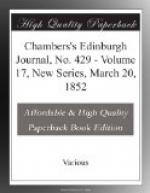Having made a lucky purchase of butter, Samuel went amongst traders of his own kind for orders, and at first met with little but contempt. He persevered, nevertheless, and in a little time made his way. By little and little his house, of which he became a partner, acquired a footing, and began to be talked of as a kind of prodigy for a village. The leading principle followed, was to do business entirely by ready-money, in buying as in selling. A wonder may be felt how Mr Budgett contrived, with no advantage of capital at starting, to act upon this rule. The plan is simple, and may be easily followed. Let the transactions be in a proper proportion to the means. It looks a slow plan; but, in reality, by securing an exemption from pecuniary embarrassment, it allows a business, other circumstances being equal, to go on faster than might otherwise be the case. Mr Budgett could accept small profits on his ready-money transactions, and by their frequency, outstrip heavier-pursed but also heavier-minded men.
The leading maxims of Samuel Budgett in business were—Tact, Push, and Principle. In the two former, he was a great genius, and much he no doubt was indebted to them. Yet we are inclined to think that Principle had the chief hand in his success. He was entirely a just man. He would rebuke a young salesman more severely for a slight inequality in his weighing-scales against the public, than for a neglect of his duty. It was a custom of grocers to mix up pepper with an article called P.D. Mr Budgett long kept a cask of P.D.; but at length, reflecting seriously on it one evening, he went to the shop, re-opened it, took out the hypocritical cask to a neighbouring quarry, and there staved it, scattering the P.D. amongst the clods, and slags, and stones; after which he returned with a light heart to bed. There was also a benevolence at the bottom of all Mr Budgett’s proceedings as a man of business. It appeared strongly in his relations to his subalterns and working-people. Though a strict disciplinarian, and not to be imposed upon in anything, he was so humane and liberal towards all around him, that they served him as much from love as duty. He has discharged men for misconduct or disloyalty, and afterwards pensioned their families till they got other employment. His liberality in supporting charitable institutions, and relieving private cases of distress, knew hardly any bounds; but, at a fair computation, it has been estimated at about L.2000 a year.
Observing one of his men looking for some time very melancholy, he called him up, and inquired into the cause. ’The sickness of his wife had entangled him in debt; he could not eat, he could not sleep; his life was a misery to him, and he had exclaimed with a pathos that sunk deep into my dear relative’s tender heart: “Master, I am in debt; every time I go near the river, something bids me fling myself into it, telling me there’s water enough to rid me of all my troubles; and that if I don’t, I shall be sent into the prison there for debt!”




